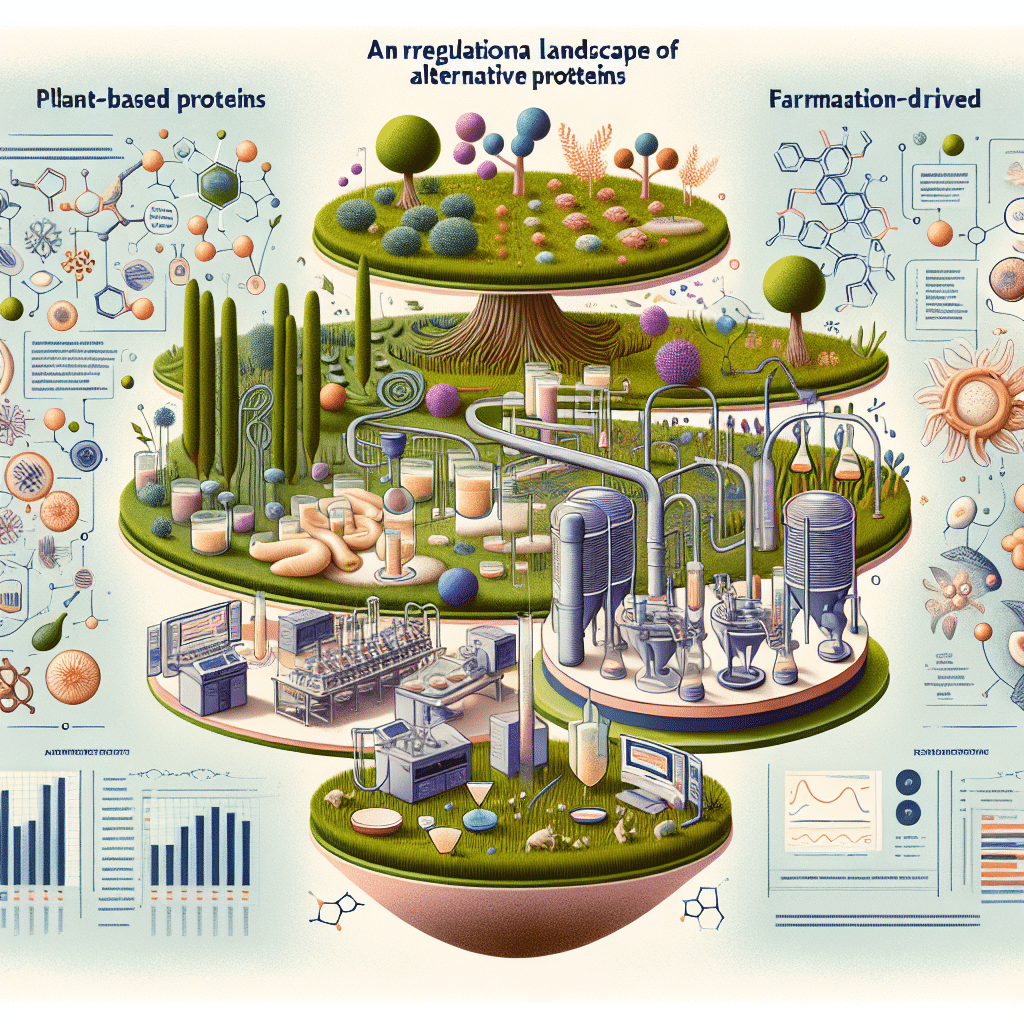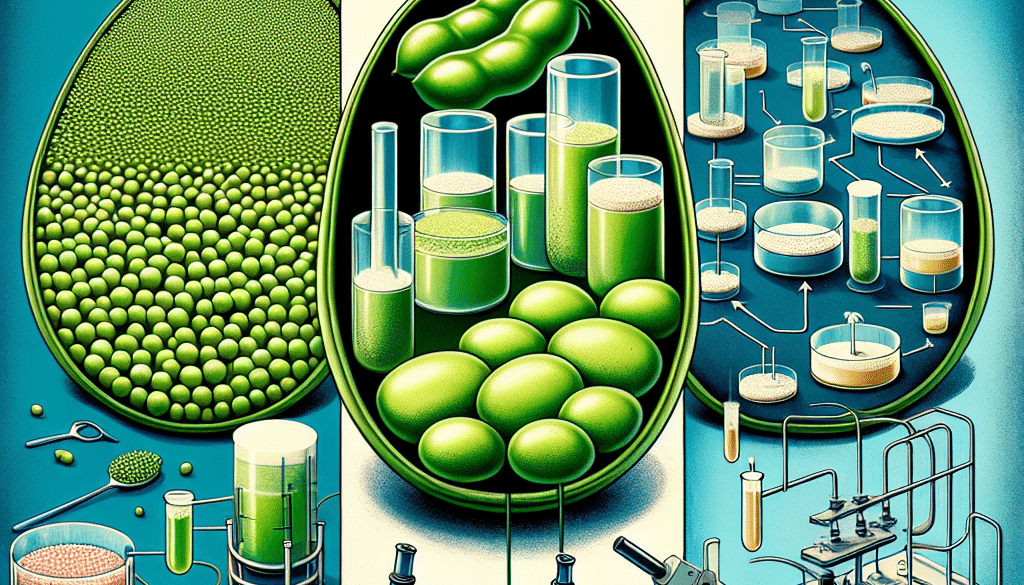The Regulatory Landscape of Alternative Proteins: Plant-Based, Fermentation and Cell-Based
-
Table of Contents
- Exploring the Regulatory Landscape of Alternative Proteins: Insights and Trends
- Plant-Based Proteins: Regulations and Standards
- Fermentation-Derived Proteins: Navigating Novelty
- Cell-Based Proteins: Pioneering New Frontiers
- Global Harmonization Efforts and Challenges
- Conclusion: The Future of Alternative Protein Regulations
- Discover ETprotein’s Premium Alternative Protein Offerings
Exploring the Regulatory Landscape of Alternative Proteins: Insights and Trends

The global food industry is undergoing a significant transformation as consumer demand for sustainable and ethical food options continues to rise. Alternative proteins, including plant-based, fermentation-derived, and cell-based products, are at the forefront of this shift. However, as these innovative food technologies gain popularity, they also encounter complex regulatory landscapes that vary across regions. This article delves into the current state of regulations for alternative proteins, highlighting the challenges and progress within this burgeoning sector.
Plant-Based Proteins: Regulations and Standards
Plant-based proteins, derived from sources such as soy, peas, and rice, have been part of human diets for centuries. However, the recent surge in plant-based meat and dairy alternatives has prompted regulatory bodies to establish clearer guidelines to ensure consumer safety and accurate labeling.
- The United States Food and Drug Administration (FDA) oversees plant-based products under the same regulations as traditional foods, focusing on safety and proper labeling.
- In the European Union, the European Food Safety Authority (EFSA) requires that plant-based products meet specific standards for composition, nutrition, and labeling.
- Novel foods, including some plant-based ingredients not traditionally consumed in the EU, must undergo pre-market authorization.
Statistics show that the plant-based protein market is expected to reach $14.5 billion by 2025, indicating the importance of robust regulatory frameworks to support this growth.
Fermentation-Derived Proteins: Navigating Novelty
Fermentation is an age-old process that is being repurposed to create alternative proteins. These include products made using microbial fermentation, such as fungi-based proteins, and precision fermentation, which produces specific proteins like dairy-identical casein and whey.
- In the US, the FDA requires that fermentation-derived proteins be Generally Recognized as Safe (GRAS) before they can be marketed.
- The EU’s novel food regulation also applies to fermentation-derived proteins, necessitating a thorough risk assessment before approval.
Despite the regulatory hurdles, the fermentation protein market is growing rapidly, with a projected compound annual growth rate (CAGR) of 5.7% from 2020 to 2027.
Cell-Based Proteins: Pioneering New Frontiers
Cell-based or cultured meat involves growing meat directly from animal cells, offering a sustainable alternative to conventional animal farming. This sector is the newest and faces unique regulatory challenges.
- The FDA and the United States Department of Agriculture (USDA) have agreed to jointly regulate cell-based meats in the US, ensuring both food safety and proper labeling.
- In Singapore, the Singapore Food Agency (SFA) became the first regulatory body to approve the sale of cell-based chicken in 2020.
- Regulatory frameworks in other regions, including the EU and China, are still in development as they assess the safety and labeling requirements for cell-based meats.
With the cell-based meat market anticipated to reach $140 million by 2025, the establishment of clear regulations is critical for consumer acceptance and industry growth.
Global Harmonization Efforts and Challenges
As alternative proteins become more globalized, there is a growing need for harmonized regulations to facilitate international trade and ensure consistent safety standards. However, achieving global consensus is challenging due to differing cultural perceptions, economic interests, and levels of technological advancement.
- International organizations like the Codex Alimentarius Commission work towards global food standard harmonization, but progress is slow.
- Divergent labeling requirements, such as the use of terms like “milk” or “burger” for plant-based products, create additional complexity.
- Trade agreements between countries can help align standards, but they often require lengthy negotiations.
Despite these challenges, the push for harmonized regulations continues as the alternative protein market becomes increasingly interconnected.
Conclusion: The Future of Alternative Protein Regulations
The regulatory landscape for alternative proteins is evolving as rapidly as the technologies that drive this industry. While plant-based proteins benefit from more established regulations, fermentation and cell-based proteins are navigating newer, less charted territories. As the market grows and consumer demand for sustainable food options increases, regulatory bodies worldwide will need to adapt and create frameworks that ensure safety, promote innovation, and facilitate international trade.
For companies like ETprotein, staying abreast of these regulatory changes is essential to ensure compliance and market success. ETprotein’s range of high-quality plant-based proteins and L-(+)-Ergothioneine products are designed to meet the stringent standards set by global regulatory agencies, providing consumers with safe and sustainable protein options.
Discover ETprotein’s Premium Alternative Protein Offerings
ETprotein is at the forefront of providing top-tier alternative protein solutions. Their extensive product line, including organic rice protein, pea protein, and various seed proteins, caters to a diverse array of industries. With a commitment to non-GMO, allergen-free products and high purity levels, ETprotein is an ideal partner for businesses looking to innovate within the alternative protein space.
About ETprotein:
ETprotein, a reputable protein and L-(+)-Ergothioneine (EGT) Chinese factory manufacturer and supplier, is renowned for producing, stocking, exporting, and delivering the highest quality organic bulk vegan proteins and L-(+)-Ergothioneine. They include Organic rice protein, clear rice protein, pea protein, clear pea protein, watermelon seed protein, pumpkin seed protein, sunflower seed protein, mung bean protein, peanut protein, and L-(+)-Ergothioneine EGT Pharmaceutical grade, L-(+)-Ergothioneine EGT food grade, L-(+)-Ergothioneine EGT cosmetic grade, L-(+)-Ergothioneine EGT reference grade and L-(+)-Ergothioneine EGT standard. Their offerings, characterized by a neutral taste, non-GMO, allergen-free attributes, with L-(+)-Ergothioneine purity over 98%, 99%, cater to a diverse range of industries. They serve nutraceutical, pharmaceutical, cosmeceutical, veterinary, as well as food and beverage finished product distributors, traders, and manufacturers across Europe, USA, Canada, Australia, Thailand, Japan, Korea, Brazil, and Chile, among others.
ETprotein specialization includes exporting and delivering tailor-made protein powder and finished nutritional supplements. Their extensive product range covers sectors like Food and Beverage, Sports Nutrition, Weight Management, Dietary Supplements, Health and Wellness Products, and Infant Formula, ensuring comprehensive solutions to meet all your protein needs.
As a trusted company by leading global food and beverage brands and Fortune 500 companies, ETprotein reinforces China’s reputation in the global arena. For more information or to sample their products, please contact them and email sales(at)ETprotein.com today.












